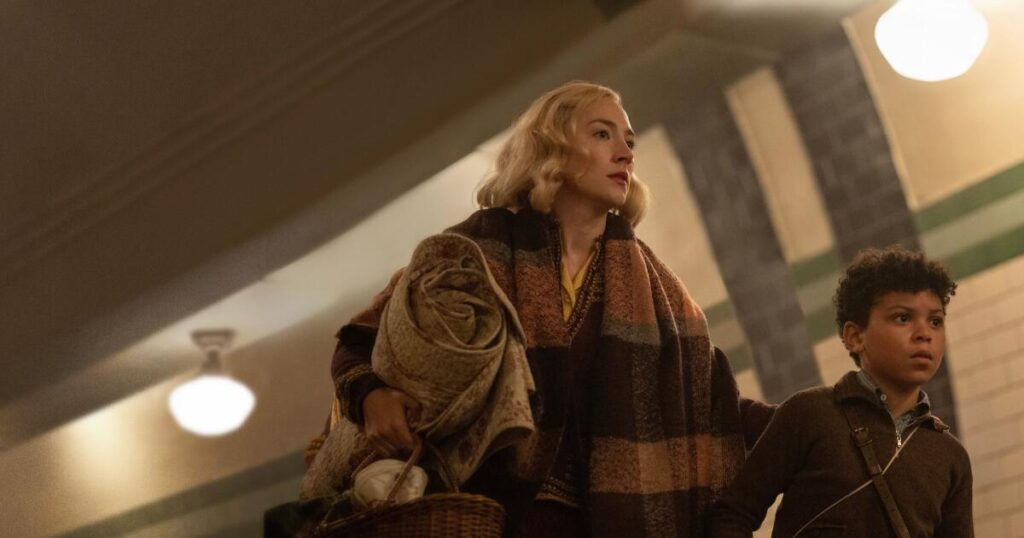[ad_1]
The Nazis’ relentless aerial bombing of London during World War II tore up the city at the same time it brought its people together — physically, out of necessity, in shelters and retreats, but also psychologically and spiritually, as a motivation to show wartime resolve.
Today we know it as England’s “keep calm and carry on” mind-set, within which director John Boorman memorably found domestic comedy for his 1987 film about that time, “Hope and Glory.” But in fellow Brit Steve McQueen’s muscular, sincere “Blitz,” his latest reckoning with the heartbeat of historical incident, life under the threat of annihilation pulsates a little more strongly than that beloved phrase would suggest. You might party a little heartier, push a little more fiercely for what you believe in, and, if you’re a boy separated from his mother, run right back into danger to feel truly safe.
Safety itself is a relative concept for a biracial child with a single white mother living in a colonial-minded nation not known for its color harmony. McQueen gave that reality anthropological scope in “Small Axe,” the 2020 series about his West Indian community’s experiences in ’70s London. In “Blitz,” that tension comes through via a sweet-faced child’s perspective during a time of tragedy.
As the movie opens, a fresh round of nighttime devastation has volunteer firefighters dealing with a wriggling, out-of-control firehose, the kind of striking image (among many throughout) that drops you right into the helplessness and chaos. Meanwhile, shelter-seeking East Enders demand that their shuttered subway station be opened and, after some yelling, get their way — a hint at what’s possible when people feel a common purpose. And yet the terror is enough that Rita (Saoirse Ronan), a munitions worker, is convinced by her loving, practical dad (Paul Weller) to send 9-year-old George (newcomer Elliott Heffernan) away as part of the mass evacuation of children to the countryside.
George, feeling abandoned and in no mood to endure more racist bullying, jumps from the train, starting a return odyssey to London — unbeknownst to his mother — that gives McQueen a chance to seed a childhood adventure within an episodic portrait of a besieged city, a place where people’s best and worst survival instincts are on view. It’s also where parental love across parallel timelines carries an undeniable magnetic force.
There are benefits and pitfalls to this schematic narrative approach. When you want more of a great character — for example, the Nigerian-born air raid warden (an irresistible Benjamin Clementine) who takes George under his wing and meaningfully intervenes when citizens grow intolerant — the small pockets of humanity burnish the overall mosaic. But when things don’t work out, as when George falls in with a band of bomb-site scavengers led by a scary Stephen Graham and Kathy Burke, “Blitz” can feel faux-Dickensian.
Sure, every insight along the way feels predetermined, even as the young star’s greatest strength lies in how his watchful eyes often betray little. Still, the earnestness — Ronan and Harris Dickinson, seen briefly as a kind neighbor-turned-soldier, are pros at that — decidedly outweighs the unavoidable sense that we’re on a briskly engineered studio tour of character-building pluck. What a tour, though, from the top-notch craft of Yorick Le Saux’s above- and below-ground cinematography to the realism of production designer Adam Stockhausen’s many bombed-out sets.
Time will tell if “Blitz” becomes a new perennial for U.K. families in the mood for band-together nostalgia and a more inclusive, unvarnished view of the country’s racist past (even during its most celebrated moment of resistance). But it won’t be for lack of trying from McQueen, who exhibits a flair for heart-on-sleeve showmanship that accommodates both poignancy and carefree joy (a sequence of music- and dance-filled nightlife) as well as righteous activism. War movies have always made use of spectacle to heighten existential dangers, but “Blitz” is a welcome reminder that a bruised, searching and flawed home front, in the waning days of empire, was its own fascinating emotional terrain too.
[ad_2]
Source link

